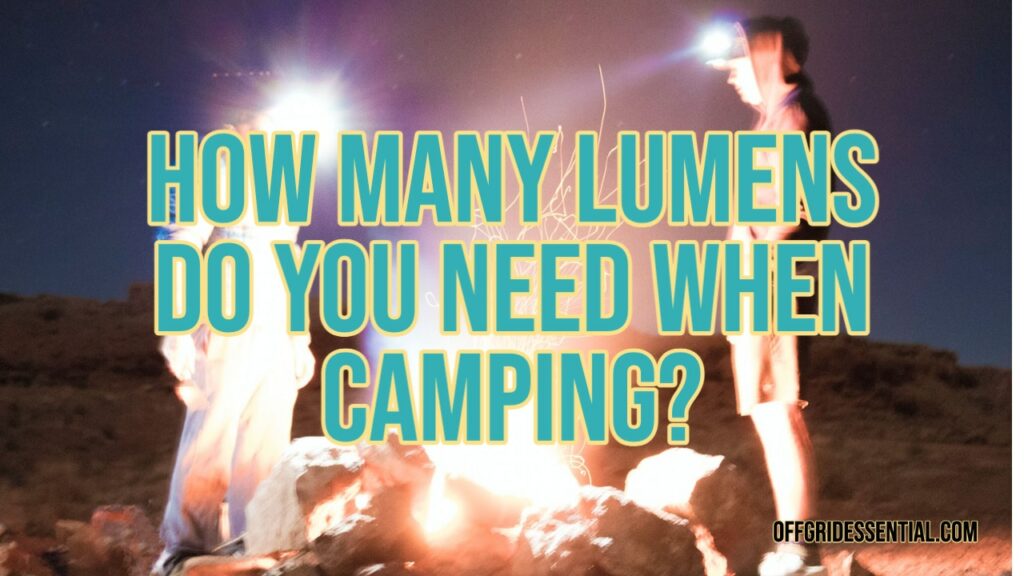Ever wonder how many lumens your lights need when camping? You are in the right spot! Let’s explore what a “lumen” is, how it matters in camping gear, and answer the question of how many lumens you will need when camping.
If you’re heading out of the city for a weekend away in the wilderness, then thinking about lighting should be one of your top priorities. It’s easy to just think that a flashlight will suffice.
Throwing in any old flashlight that you have at home will be all that you need, right? Well, you might be surprised to hear that this isn’t the case at all, and it all comes down to lumens.
If you’re unsure about what that is right now, don’t worry. We’ll take you through everything you need to know about lumens and camping and then take you through some of the equipment you will need to make sure you’re as safe as you can possibly be while enjoying nature.

What Are Lumens?
Lumens are a way of measuring light output and is defined as: “a unit of luminous flux in the International System of Units, that is equal to the amount of light given out through a solid angle by a source of one candela intensity radiating equally in all directions.”In plain terms, the larger the number of lumens advertised on a source of light, the further that light will travel.
Basically, the more lumens you have, the brighter your light source will be, and the further you’ll be able to see as a result.
You’re probably already understanding why thinking about lumens when it comes to camping is so important, but we’ll take you through our personal lumens recommendations that you’ll need for your next camping trip. If you want to get really technical, read up more at Lumens.com.
How Many Lumens Do You Need For Camping?
Most campers will need an absolute minimum of around 35 lumens (the average flashlight is around 30, so this won’t cut it, you’ll need to buy slightly more specialized gear), although most will also tell you that the more you have the better it will be.
You can pick up some flashlights and other light sources with around 150 to 200 lumens pretty easily, which should definitely suffice, but if you’re quite a safety-conscious, then you’ll be happy to hear that some flashlights can go as high as 2000 lumens.
These will obviously cost a little more than most because of the sheer amount of visibility it will give you, but it may well be worth the investment if your campsite isn’t surrounded by other light sources, as so many of them aren’t.
You know yourself what you will be most confident with, but we’d definitely recommend at least 200 lumens just to be on the safe side.
Camping is unpredictable and lighting a safe path is really important if you’re outside in the dark, stray tree roots could easily trip you and cause an injury, so make sure you come prepared with a bright flashlight that can light your path easily.
Why Is Our Recommendation So High?
The higher the amount of lumens, the brighter your light source will be, and the easier it will be for you to see.
Given that most campsites are in remote areas, away from the city lights, streetlamps, car lights, and every other light source that fills a densely populated area, you simply need more lumens. Without it, you will struggle to see more than just a few feet in front of you.
Whilst most agree that 35 lumens and above will certainly be enough, we prefer to err on the side of caution when it comes to these sorts of recommendations because you can never be sure how much light you will actually need until you find the spot you’ve decided to pitch your tent at.
If you find yourself a wonderful spot beneath thick tree branches, with no light source nearby, then you’ll be surprised by just how much darker the night seems compared to the night we’re used to in cities and towns.
That’s why we would recommend looking for light sources that have around 200 lumens each because this should be more than enough, no matter where you’re camping.
Lumens Needed For Each Type of Camping Gear:
Now that you understand more about lumens, the next thing you need to think about is what equipment you’re going to take with you.
We’ve already pointed out that lumens of around 200 are a great place to aim for, but that doesn’t mean you should just find a flashlight with 200 lumens and assume that will be all you need.
One of the biggest problems that new campers face is lighting, so it’s better to bring more along than you think you need. In fact, the three suggestions we make below aren’t just recommendations on our part – we’d argue they’re essentials!
Flashlight Lumens
Let’s start with the most obvious one. You’re going to need a flashlight. It’ll be the handiest light source you’ll have, and it will no doubt be the most used out of the three we’re listing here.
Remember, these can go up to 2000 lumens, so if that’s something you’d feel safer with having, then you should definitely try to source one with this higher lumens count. The only piece of additional advice we can give here that we haven’t covered already is to make sure you pack plenty of spare batteries for your flashlight.
Even if you’re just heading out for a long weekend, you’ll be surprised by how often you reach for your flashlight in the dark, so it’s better to come prepared and bring too many batteries than it is to find yourself stranded in the dark with a flashlight with no batteries.
The last thing to mention about flashlights is that narrow beam often works best whilst camping for a number of reasons.
First, you won’t be lighting up such a wide path in front of you that it will disturb fellow campers. Second, it’s more specific in the route you are taking, so you can really focus on what’s immediately in front of you, which is certainly a much safer option.
Finally, if you’re going for the higher lumens options out there, then the narrow beam is a must. Shining a ridiculously bright light around the campsite will lead to a lot of disgruntled campmates.
Camping Lantern Lumens
The next thing you need to think about is a camping lantern. This is such a common piece of equipment for people to overlook, but it’s as important to bring along with you as a flashlight is.
If you’re planning on sitting outside after dark, you need a camping lantern to light up the area surrounding you so you can enjoy yourselves and hold conversations.
Again, 200 lumens is our recommendation, it’ll be more than enough to light up the surrounding area without being too unreasonable and inconsiderate of other campers.
We will say that if you’re only really planning on using a camping lantern inside your tent, then 200 lumens is too much and will seem far too bright. For this, we’d recommend around 100 lumens for use inside.
If you’re new to camping and you hoped you would just be able to light a campfire after dark, then we’d say be incredibly wary of this. So many campsites expressly forbid it, and some have very specific designated areas in which you can do this.
It can be dangerous to build a campfire, especially if you have children running around, so a camping lantern is definitely a much safer option for you and your family.
Headlamp Lumens
Now, of the three we’ve listed, a headlamp might not seem necessary. You have a camping lantern for when you’re sat in an area for a period of time, and a flashlight for when you’re on the move – you don’t need a headlamp too, right? We’d actually argue that you do.
A flashlight is a useful thing to have, but you do have to carry it everywhere with you. It’s easy to head out for a walk around dusk, just as the sun is setting, and then realize after dark that you’ve left your flashlight back at the tent. You won’t have this problem with a headlamp.
Not only that, but a headlamp keeps your hands free. From a safety perspective this is great, because it means you can catch yourself more easily if you trip.
From a practical perspective, though, it’s invaluable. You have no idea what you’ll need whilst camping until you need it, and those things might turn out to be heavy. Whether it’s water, food, supplies, you name it, it’ll be much easier to grab it in the dark if you have a headlamp lighting your way rather than a flashlight.
In terms of lumens, we’d recommend 100 lumens for headlamps. This is because you have less control over the direction you point it in, and we don’t want to anger any fellow campers by shining too bright a light in their direction.
Besides, another great use for a headlamp is reading in the dark, so you won’t need a particularly bright light for this either. 100 lumens for a headlamp is a good ballpark to aim for when you’re looking to purchase one before your next trip.
The Verdict on Lumens For Camping Gear
Camping can be dangerous for those who come unprepared. Lighting is an essential thing to think about before any camping trip, and checking the lumens of your light sources is imperative. We recommend bringing along a flashlight, a camping lantern, and a headlamp.
For both the flashlight and camping lantern 200 lumens would be perfect, and a headlamp should be slightly less at around 100 lumens. Follow this advice, and you should have a perfectly safe, well-lit camping trip.
